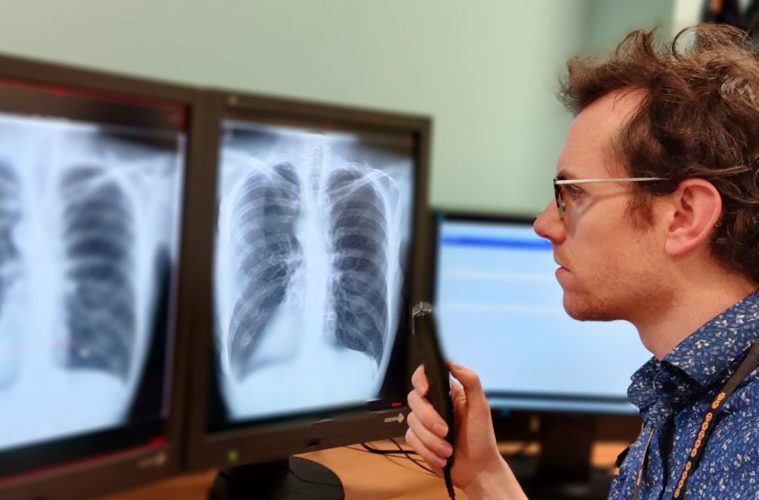Artificial intelligence could help speed up COVID-19 diagnosis in Emergency Departments, thanks to the development of a new algorithm designed to identify the virus.
The AI programme, created by Bering Limited in collaboration with a Greater Glasgow and Clyde research team, processes images of chest x-rays of patients displaying shortness of breath and aims to give an accurate result in under three minutes, which is significantly faster than the average two hour wait for a PCR test to be completed.
The BraveCX-CovIx algorithm, has been validated in more than 3,000 chest x-rays across four NHS Greater Glasgow and Clyde (NHSGGC) sites and has been found to be able to differentiate between normal, abnormal, non-COVID-19 pneumonia and COVID-19 pneumonia.
The work was conducted by iCAIRD, Scotland’s Industrial Centre for Artificial Intelligence Research in Digital Diagnostics, in partnership with NHS Greater Glasgow and Clyde and uses Canon Medical Research Europe’s Safe Haven Artificial Intelligence Platform (SHAIP) as well as datasets from the Glasgow Safe Haven.
A research paper, published on Thursday (October 14), further validates the AI technology after finding it performs on par with four certified radiologists.
Prof David Lowe, Joint Clinical Lead of the West of Scotland Innovation Hub and an Emergency Medicine Consultant at Queen Elizabeth University Hospital said: “This is yet another welcome development demonstrating the potential for AI to support clinicians ensuring patients are getting the highest quality and most relevant treatment.
“Through testing we have been able to see that this algorithm can identify COVID-19 on chest x-rays that are routinely taken during initial clinical assessment. This will not just help with the treatment of patients but speeds up the process of isolating infected patients to ensure the spread is reduced.”
Dr Mark Hall, Radiology Consultant at NHSGGC added: “We continue to see the positive impact artificial intelligence has on radiology, from reducing waiting times to improving accuracy and reducing pressures on staff. This research paper further highlights the importance of using developments in AI to enhance diagnosis and treatment.
“The level of accuracy allows consultants to make even more informed decisions as we have a greater pool of data to use. There can often be a misconception that AI input will mean the public get less time with doctors, but this is not the case. Technology like this will help us speed up processing high numbers of similar cases, while retaining accuracy, allowing for more time with patients and more complex cases.”
As part of the iCAIRD programme, NHSGGC is continuing to trial and evaluate the technology to establish whether it could be used to predict and establish other illnesses such as pneumonia, chronic obstructive pulmonary disease, and lung cancer.
The partnership approach fostered by iCAIRD brings together NHS , academia and industry which has made it possible to explore the application of AI in healthcare ‘Development and prospective validation of COVID-19 chest X-ray screening model for patients attending emergency departments’ was published on Thursday, October 14.


